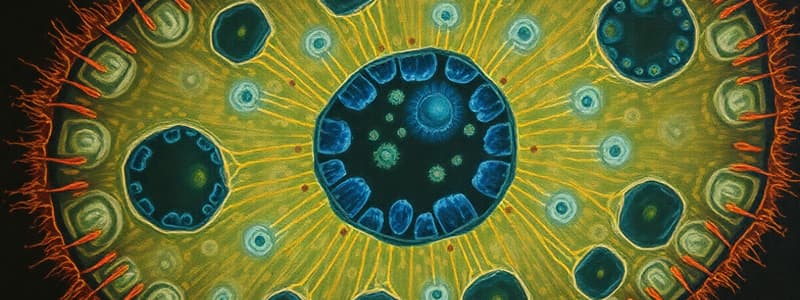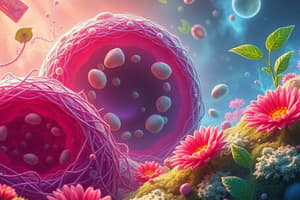Podcast
Questions and Answers
Which of the following components is exclusively found in plant cells?
Which of the following components is exclusively found in plant cells?
- Mitochondria
- Cell Wall (correct)
- Vacuoles
- Nucleus
Who was the scientist that proposed the statement 'All cells come from pre-existing cells'?
Who was the scientist that proposed the statement 'All cells come from pre-existing cells'?
- Matthias Schleiden
- Theodor Schwann
- Robert Hooke
- Rudolf Virchow (correct)
What is a key feature of complete metamorphosis in certain organisms?
What is a key feature of complete metamorphosis in certain organisms?
- Only juvenile aquatic stages
- Absence of a pupal stage
- Direct development into adulthood
- Presence of a larval stage (correct)
In which type of cell is a centriole NOT typically found?
In which type of cell is a centriole NOT typically found?
Which of the following is true regarding vacuoles in plant and animal cells?
Which of the following is true regarding vacuoles in plant and animal cells?
Flashcards
Cell Wall
Cell Wall
The barrier outside the cell membrane found in plant and bacterial cells.
Chloroplast
Chloroplast
Found only in plant cells, it is the site of photosynthesis.
Embryogenesis
Embryogenesis
The process by which an organism develops from a fertilized egg to an adult.
Metamorphosis
Metamorphosis
Signup and view all the flashcards
Complete metamorphosis
Complete metamorphosis
Signup and view all the flashcards
Study Notes
Cell Structure
- Plant Cell: Cell wall, vacuoles (storage), chloroplasts, and flagella (only in gametes).
- Animal Cell: No cell wall, small/no vacuoles, no chloroplasts, and flagella.
- Both: Mitochondria, Golgi body, endoplasmic reticulum (rough and smooth), nucleus, cytoplasm, ribosomes.
- Cell Wall: Barrier outside the cell membrane, found in plant and bacterial cells. Large in plant cells, small in animal cells.
- Vacuoles: Storage for water, food, and enzymes.
- Centrioles: Aids in cell division, made of microtubules.
- Mitochondria: Powerhouse of the cell.
Cell Theory
- Robert Hooke: Used a crude microscope to observe cork, coined the term "cells."
- Anton van Leeuwenhoek: Improved microscopes, observed living cells.
- Matthias Schleiden: Stated plant cells are made of cells.
- Theodor Schwann: First statement of cell theory ("All plants are made of cells").
- Rudolf Virchow: Second statement of cell theory ("All cells come from preexisting cells").
- Cell Theory: Developed in the mid-1800s; cells are the basic unit of life; all living things are composed of cells, and new cells come from existing cells.
Asexual/Sexual Reproduction
- Life Cycle: Fertilization, zygote, embryogenesis, embryo, organogenesis, young, maturation, adult, gametogenesis, gametes (repeat).
- Metamorphosis: A feature in some organisms involving rapid change from immature to adult stages (e.g., beetles, mosquitos, butterflies complete metamorphosis; aquatic juvenile stage, no pupa stage: dragonflies, grasshoppers).
Studying That Suits You
Use AI to generate personalized quizzes and flashcards to suit your learning preferences.




